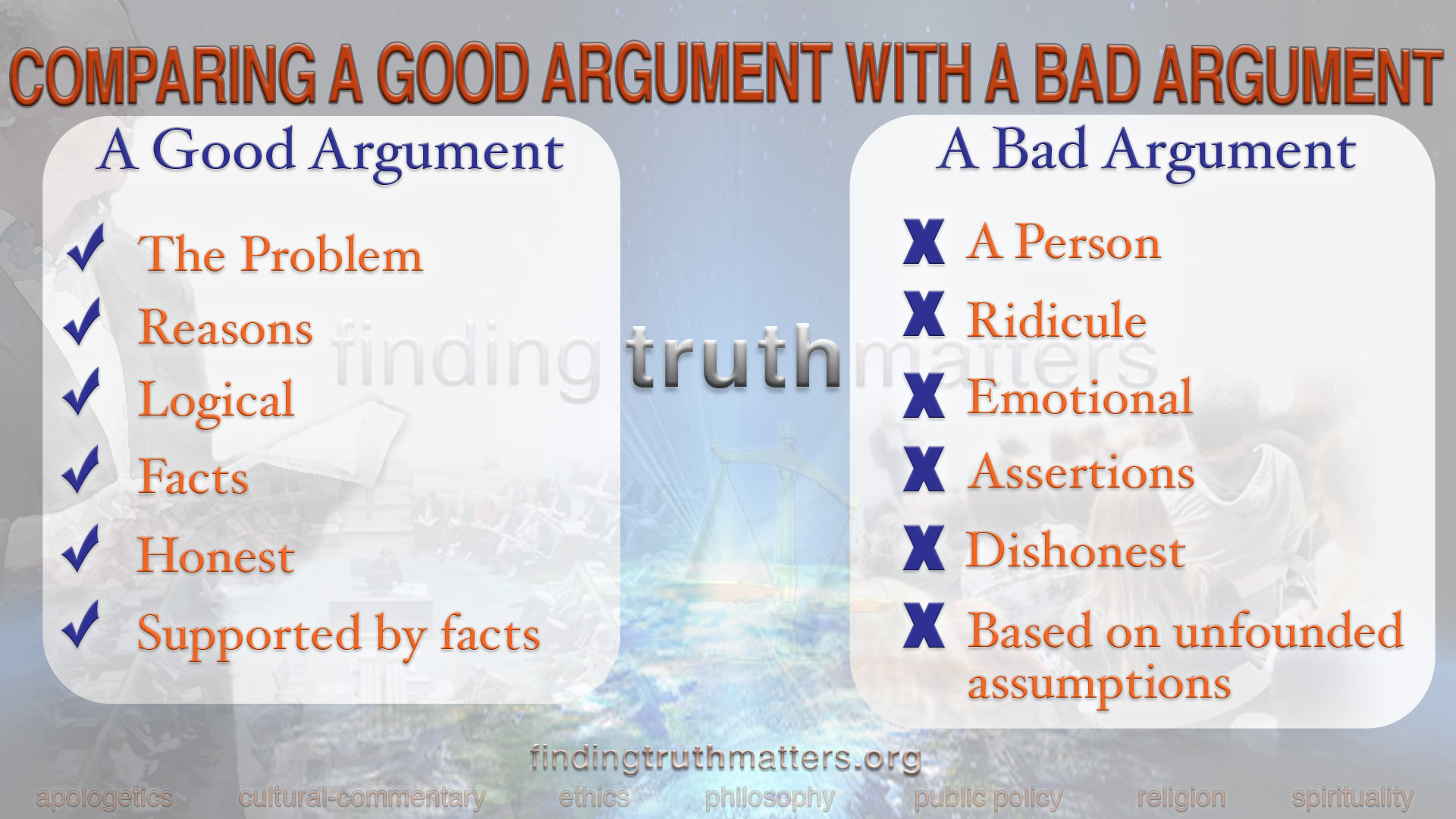The 7 Principles For Making A Strong Argument
 What makes for a strong argument? By ‘argument’, we don’t mean quarrel or fight, we mean case. Perhaps a court room context is a better way to think of making an argument or case. It becomes very important during election campaigns and public debates to be able to distinguish a strong argument from a weak one. Of course, issues of public debate don’t always involve matters of Public Policy. Strong or weak arguments also happen when people discuss matters matters of history, parenting, religion, or the arts. Here’s some things which might help you to distinguish a strong argument from a weak one.
What makes for a strong argument? By ‘argument’, we don’t mean quarrel or fight, we mean case. Perhaps a court room context is a better way to think of making an argument or case. It becomes very important during election campaigns and public debates to be able to distinguish a strong argument from a weak one. Of course, issues of public debate don’t always involve matters of Public Policy. Strong or weak arguments also happen when people discuss matters matters of history, parenting, religion, or the arts. Here’s some things which might help you to distinguish a strong argument from a weak one.
A strong argument –
- Is based on reason rather than assertions.
- Shows respect for differing points of view rather than ridiculing their proponents.
- Resonates with what is known to be true.
- Is not built upon an emotional argument. (For example, “If you don’t agree with me I will be very sad.”)
- It distinguishes the issue from the personalities involved.
- Might be able to be put simply, but it can rarely be reduced to a mere slogan.
- Is not grounded in who is making it, or how many agree with it.
1. Reason Rather Than Assertions
Reasons are grounded in evidence, facts, or logic. For example, if we made an historic claim, such as Neil Armstrong walked on the moon in 1969, we need to give sufficient historic evidence to support this claim. This might involve verifiable eye-witness accounts – which could easily be supplied. If we made a claim which we stated was a fact, such as the earth has a moon, we would have to be able to verify this, which might include direct observation. If a claim was actually false, such as the claim that there is a pink porcelain tea-pot orbiting Mars, there would have to be ways to show that it was false, which again might include observation. (This is called ‘falsifiability’. Any true claim needs to be falsifiable – that is, if it was indeed false, it could be shown to be so.) If we made a logical claim, we would have to demonstrate that our premise was correct, our second premise was correct, and that our conclusion followed from these premises. For example, Men are mortal > Socrates was a man > Therefore, Socrates was a mortal. This is called ‘a logical syllogism’.
If a claim lacks evidence, factual support, or logical coherence, it may be an assertion. To assert something is to make a claim without any good reason supporting that claim.
Questions:
Is the claim, “Men and women are equal”, using reason or making an assertion?
How could the claim, “Men and women are equal”, be made reasonably?
If someone made the claim, “Men and women are equal”, how could you tell if they were being reasonable or being assertive?
2. Respect Rather Than Ridicule
A respectful argument fairly represents an opposing view. Someone has said that you never understand your opponent’s position until you can state it better than they can. This is showing respect. Sometime ago I was invited to give an address at a University where there were protesters who objected to what I was about to say. Before I was introduced, these protesters brought their placards into the auditorium and were primed to make their objections known as I spoke. But something unexpected happened. I began my presentation with the case for the other side. In fact, I presented their side of the case better than anyone from their side had publicly done. I saw these protesters put their placards down and give me their attention. After my introduction, I gave the rebuttal to these arguments. Several hundred people, including the protesters, gave me their attention and were very respectful. I haven’t always been shown this level of respect when making a public policy presentation. If you have a reasonable case and want to ensure that you at least get a hearing, you are more likely to attain this is you show respect for your ‘opponent’s’ case, rather than ridiculing your opponent.
Examples of ridicule:
Of course you would say that, you’re a woman.
What would you know about science, you’re a Christian!
That’s stupid!
Everyone knows that’s wrong!
You’re a bigot for believing that.
3. Resonates With Truth
A claim resonates with truth when it corresponds to reality or to what we already know to be true. There is an old saying that says, What is new is probably not true. What is true is probably not new. This is why good science is fundamentally sceptical. When a new scientific claim is made, it must be rigorously tested by qualified assessors.
Conversely, when a claim is made which doesn’t resonate with the truth and does not offer evidence, facts, or logic, as its basis, we have good reasons to at least be sceptical of the claim, if not to be dismissive of it. This especially applies to conspiracy theories. This requires a comment about the value of circumstantial evidence.
Indirect clues form circumstantial evidence. For example, if you are inside a building when someone opens the external door so that you can hear rain, and when this person walks into the inside of the building where you are, they take off their dripping wet raincoat, you could have good circumstantial evidence for believing that it is raining outside. This is despite you not directly seeing any rain at the time. It might surprise most people to learn that nearly 99% of murder cases are successfully tried on the basis of circumstantial evidence. Conspiracy theories leverage the power of circumstantial evidence. Therefore, circumstantial evidence is subject to a special test: Inference To The Best Explanation. Did Lee Harvey Oswald shoot JFK? There are several popular conspiracy theories which accuse the Mob, the FBI, or the CIA. But the circumstantial evidence pointing to any of these conspiratorial suspects is not able to account for all of the data associated with JFK’s tragic assassination, whereas identifying Lee Harvey Oswald as the shooter does accommodate all the circumstantial evidence.
4. Reasonable Rather Than Emotional
A claim is based on emotion rather than reason if the one making it –
- states that to disagree with them would be hate
- says that opposing their view would make some people depressed
- asserts that it must be true because it’s what their father taught them.
You will note that none of these are reasoned arguments.
5. Addresses The Issue Rather Than The Person
This is particularly needed in a heated quarrel between a husband and a wife where it is all too easy to attack the person rather than address the issue. Ridicule mocks a person, attacking hurts a person. Comments like, “The problem with you is…” “You’re just like you mother!” “You’ve always been hopeless!”
If you’re ever under attack, try to take the steam out of the fight, with an apology and an appeal: “I’m sorry for hurting you. I’d like to make things right. Can we talk about the issue?“
6. More Than A Slogan

 In an age where digital distraction has reduced concentration spans to little more than that of a gold fish, slogans work! A slogan takes little more than two seconds to share. For those attempting to solve complex problems or make something good something great, the needed ideas cannot possibly be stated in 2 seconds! Great ideas may be be simple but they are rarely simplistic. Slogans may be popular and garner popular support, but a strong argument needs to have substance and reasoning behind it.
In an age where digital distraction has reduced concentration spans to little more than that of a gold fish, slogans work! A slogan takes little more than two seconds to share. For those attempting to solve complex problems or make something good something great, the needed ideas cannot possibly be stated in 2 seconds! Great ideas may be be simple but they are rarely simplistic. Slogans may be popular and garner popular support, but a strong argument needs to have substance and reasoning behind it.
7. Not Who, But What And Why
“Professor Such And Such believes it!” is not a strong argument because a strong argument does not hinge on who believes it, but why they believe it. A strong argument has substance and reasoning not merely signatories (that’s called a petition not an argument).
The next time there is an election, political campaign, family disagreement, or Public Policy debate, consider who is making the strongest argument before casting your vote or making up your mind one way or another. And if you are seeking to persuade others to your way of thinking consider how you could frame your argument around these seven guidelines to making a strong argument.
Dr. Andrew Corbett
-
Sale!

5 Things We Need To Do To Break Our Church’s 200 Barrier, Premium Audio
Original price was: $1.75.$0.95Current price is: $0.95. -
Sale!

A Morning With Izaak Walton – The Compleat Man, Premium Audio
Original price was: $1.75.$1.25Current price is: $1.25. -
Sale!

Apologetics Part 1 – Introduction To Apologetics, Premium Audio
Original price was: $1.75.$0.95Current price is: $0.95. -
Sale!

Apologetics Part 2 – The Apologetic Arguments For God, Premium Audio
Original price was: $1.75.$0.95Current price is: $0.95.










































0 Comments